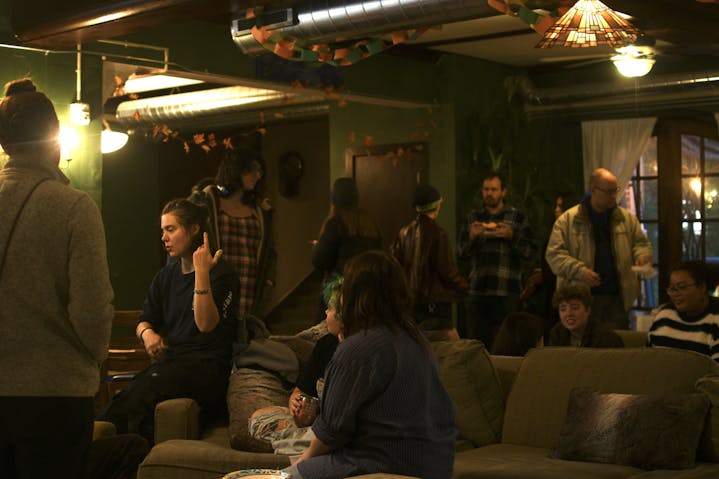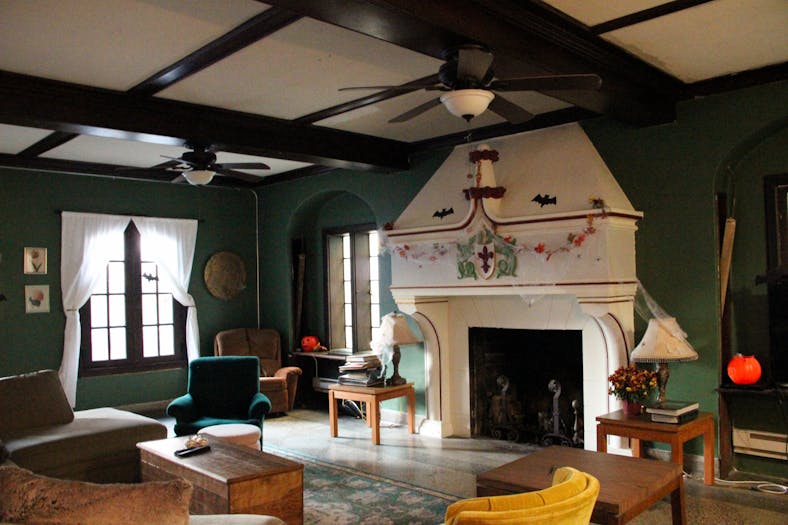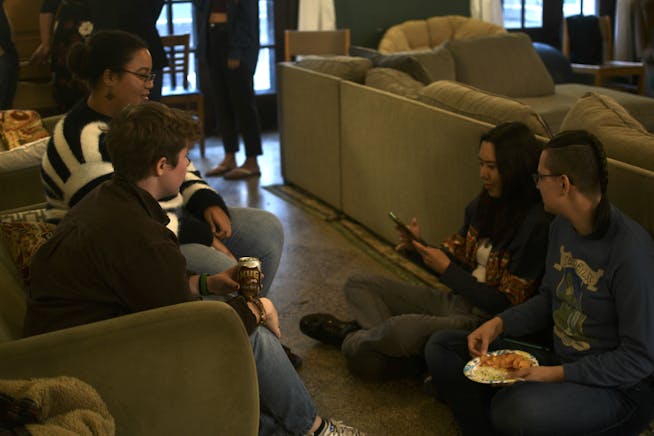Once a hollow brick shell, the Zoe Bayliss Cooperative’s new house on Langdon Street burst with warmth on a sunny October afternoon.
Chains of decorative fall leaves hung from the ceiling, vintage lamps gave off an inviting glow and the smell of home-cooked food filled the house as residents and their families poured in for a party.
“Seeing people milling about, eating and drinking and existing in this place that was full of boxes and pieces of wood four months ago was just surreal,” said Molly Nortman, the current Zoe Bayliss president.
For Zoe Bayliss residents, the Oct. 22 housewarming was a jubilant celebration of resilience and perseverance following a tumultuous moving process punctuated by two years of fraught tensions with University Housing.

After housing the Zoe Bayliss co-op for 67 years, the old site, 915 W. Johnson Street, is set to be razed and replaced by Levy Hall, the University of Wisconsin-Madison’s new humanities building, by 2026. University Housing informed Zoe Bayliss officers their building would be torn down in summer of 2021, which gave the group about two years to find a new home.
When the University of Wisconsin-Madison failed to offer compelling solutions despite months of deliberation, Zoe Bayliss members turned to local nonprofit organization Madison Community Cooperative (MCC) for support.
Things worked out for Zoe Bayliss, which now leases a building from MCC at 636 Langdon Street.

Co-op residents said they were happy and thriving in their new home. “This building is definitely more homey,” resident Eli Song said. “For starters, it isn’t shaped like a brick, and it doesn't look like a jail.”
But the group’s leaders who worked with University Housing say they felt a lack of support for affordable housing and cooperative living at a time when student housing prices and Madison rents are skyrocketing faster than any other city in the nation.
“It was frustrating because they talk a lot about wanting to support affordable housing, but then, when push comes to shove, they don't seem to take that opportunity seriously,” Angela Maloney, former Zoe Bayliss president, told The Daily Cardinal. “They just care about their master plan and what they can do with the new building.”
University tried to force co-op out for years
UW-Madison wasn’t subtle in their opposition to the co-op, members said.
“They were like, ‘We will kick you out, tear you down, and you will cease to exist.’ That is that, and they were ready to wash their hands of it,” Nortman said.
University Housing threatened to tear down the co-op’s previous building since the 1980s, according to Peggy Haus, an alumni on the Zoe Bayliss Board.
Nortman said administrators she met with didn’t think members wanted to continue the cooperative.
“[University] Housing was always trying to be shady, tell us half-truths and try to make it seem like they weren't doing something evil when they were,” Nortman added.
University Housing offered the solution of moving into one floor of Phillips Residence Hall, but Zoe Bayliss members — who communally vote on issues facing the house — unanimously voted to reject it.
Their solution would have cut membership in half, raised rent and reduced common spaces, “defeating the purpose of affordable housing,” Nortman said.
“It would have had the name and nothing else. It was not a real solution,” Nortman said.
In a statement to The Daily Cardinal, University Housing said it “worked hard to offer alternative spaces” for Zoe Bayliss and was “glad that they settled into a location that is a good fit for their residents.”
Zoe Bayliss members said they were relieved to sever ties with University Housing.
“We don't have to deal with them ever again,” Nortman said. “Which is really nice because they didn't care for us. It was really stressful and traumatic to deal with them.”
The moving process
Zoe Bayliss looked at other houses before finding a solution with MCC. Those options were expensive and would have required raised rents and extensive fundraising, members said.
Once the group settled on the Langdon property, Zoe Bayliss officers Maloney, Nortman and Sara Hartke, the business manager, moved into the new house over the summer to facilitate the renovation with MCC before the Aug. 15 move-in date.

Officers were supposed to add finishing touches like painting and decoration while MCC was meant to supply the bulk of the work.
“We were going to take the reins and make it a home,” Nortman said.
However, when the three moved in, crucial aspects were unfinished. There were large gaps left from the fire shaft, broken windows and an unfinished kitchen. Many bedrooms, including the one Nortman lived in, were under active construction.
Nortman said initial conditions at the house were so bad that MCC workers entered with hazmat suits.
“The renovation process was an experience,” Nortman added.
With no kitchen, officers lived off microwave and toaster oven-made food. Without a sink, they resorted to using dishes sparingly and washing them outside.
Despite 30-hour work weeks, renovation was a slow, grueling process — sometimes up to 12 hours a day. As the summer continued with minimal progress, there was more urgency for MCC to get things completed.
While MCC was agreeable during the process, there were still issues.
“We sent [MCC] this itemized list: What is the plan for MCC to get these things done? How much time [will it take]? Is this under control?” Nortman said.
“We had to push a little bit harder than we would have liked to with MCC to make sure that they finished all the projects that they had told us were going to be done,” Maloney added.
As MCC struggled to find contractors and workers for the project, officers asked friends and family to pitch in. Completing the house became a group project, they said.
“My dad put up all the curtain rods in the house. My mom helped to clean basically the entire house,” Maloney said. “Sara’s parents came, and her dad installed our new reverse osmosis water tap in the kitchen.”
With helping hands from friends and family, the house was ready by Aug. 15. Move-in day was an emotional moment for residents and staff who stuck with Zoe Bayliss for the support, community and people despite facing an existential threat.

“I met a lot of my best friends at Zoe Bayliss,” Nortman said.
“I stayed because of the kids, even if they’re not really kids,” added Phil Loder, a former Zoe Bayliss chef. He felt the cooperative became a family that inspired its residents and let them thrive.
Members and alums said support shown for Zoe Bayliss throughout this process illustrates its community and importance.
“It's an environment that's really supportive to [its residents],” Maloney said. “We provide for them and so it makes them want to give back.”
“I couldn't stomach the idea of not giving absolutely everything I had to make sure that this place kept existing,” Nortman added. “I feel like it does something that no other place can do.”






